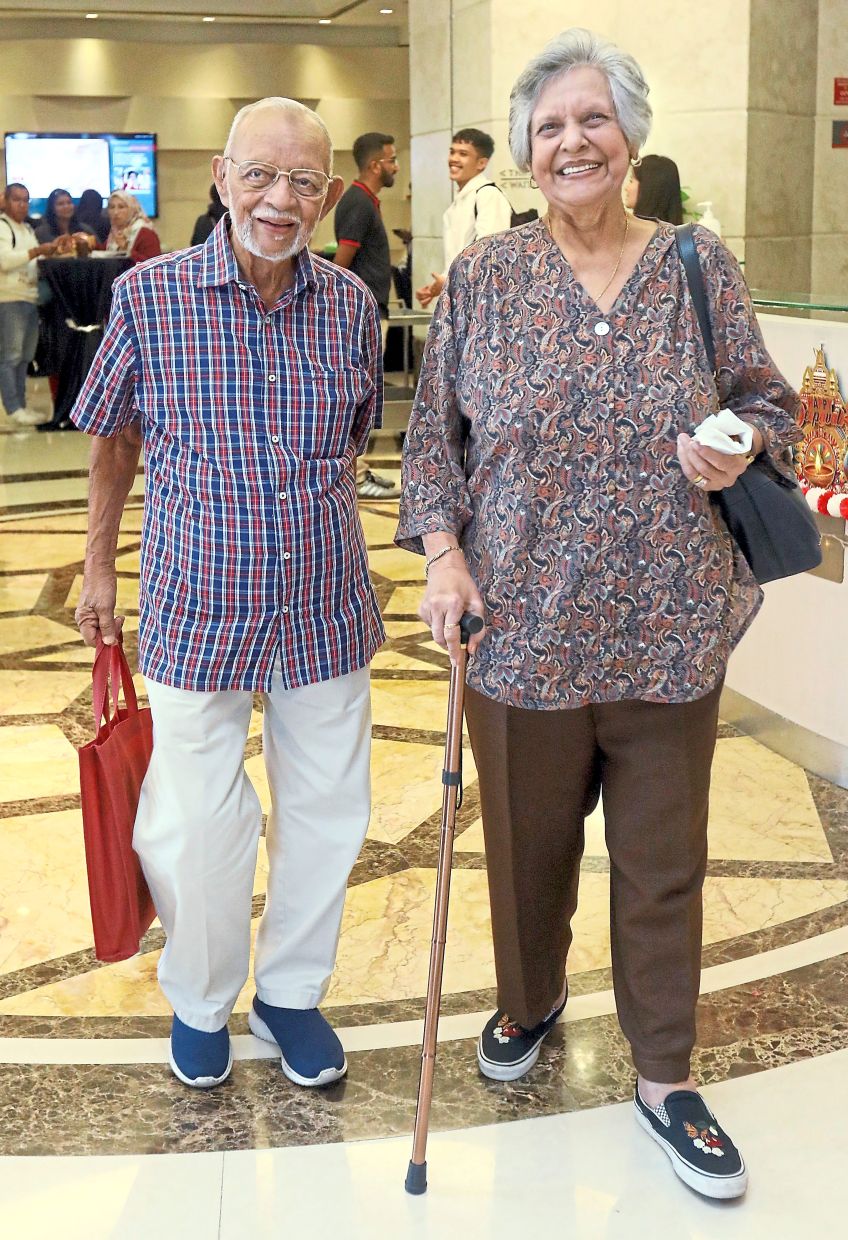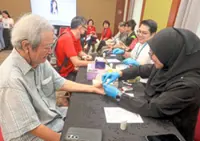Dr Choy explaining to the audience that sadness and depression are not the same thing. — Photos: AZLINA ABDULLAH/The Star
Have you ever felt so sad, not just momentarily, but persistently – that even the simplest things feel heavy?
You wake up tired, unmotivated and unsure when this feeling will end.
Day after day, it lingers.
At some point, you start to feel like you’re no longer yourself.
According to general psychiatrist at Universiti Tunku Abdul Rahman (UTAR) Hospital, Dr Choy Seng Kit, sadness is a normal human emotion – but it’s not the same as depression.
“There are three key differences that separate normal sadness from depression,” he explained.
“Think about a recent event that made you sad – perhaps a loss, a major change, or even no clear reason at all.”
Sadness, he said, usually comes with only a few symptoms.
“You may feel low or lose your appetite, but you can still experience moments of happiness or pleasure.
“It’s temporary, lasting hours or days, and you’re still able to go about daily life, whether it’s studying, working, or doing chores,” said Dr Choy.
Depression, on the other hand, is deeper and far more complex.
“The sadness is constant and overwhelming, and those affected often find it almost impossible to feel joy.
“The condition typically lasts at least two weeks, often much longer, and causes significant emotional distress and impairment.
“People may lose interest in hobbies, struggle to function and feel little motivation to study or work,” said Dr Choy, who was speaking at the recent StarLive workshop on Behind the Smile: Discover the Hidden Reality of Depression.
When most people picture depression, they imagine someone visibly sad, withdrawn, or unable to get out of bed.
But there’s another form – smiling depression – where individuals hide their pain behind a cheerful façade.
Dr Choy explained: “It could be a mother laughing with her child while battling exhaustion inside; a colleague who seems lively in meetings but stares blankly at the screen afterwards; or a student saying, ‘I’m fine,’ while sinking into an invisible emotional void.”
Stigma still lingers
Malaysia has only about 500 psychiatrists and a similar number of clinical psychologists, which translates to roughly one specialist for every 65,000 people.
Despite improvements over the years, it’s still below the World Health Organization’s (WHO) recommended ratio of one per 10,000 in developed nations.
But according to Malaysian Mental Health Association (MMHA) president Professor Datuk Dr Andrew Mohanraj, the bigger problem isn’t the shortage – it’s that many still don’t seek help.
“Our culture in Malaysia and across the region still carries a heavy stigma around mental illness – and that stigma shapes how we approach mental health,” he said.
Prof Andrew noted that many Malaysians still turn to sinsehs, go to samis or bomohs before consulting a psychiatrist or psychologist.
“We’re often their last resort,” he pointed out.
“Some have spent RM20,000 on alternative treatments, yet when told a psychiatrist’s consultation costs RM300, they’re shocked, ‘So expensive for 15 minutes?’”
This reaction, he added, reflects a deep-rooted misunderstanding of what mental healthcare truly involves.
“And really, we can’t fully blame them.
“Many fear being labelled ‘crazy’ just for seeking help.
“This fear of judgement and discrimination is one of the biggest barriers, and something we all need to work together to change,” he said.
Finding calm within
Clinical psychologist and senior lecturer at HELP Education Group, Puvessha Jegathisan, introduced one of the most widely used evidence-based therapies in clinical psychology: cognitive behavioural therapy (CBT).
CBT focuses on the link between thoughts, emotions and behaviours.
Puvessha explained how negative thoughts like “I’m useless” can trigger sadness and hopelessness, leading to withdrawal and loss of motivation – a vicious cycle that deepens depression.
Through CBT, therapists help individuals recognise and challenge unhelpful thoughts, understand their emotions, and adopt healthier behaviours.
“The goal is to help people re-engage with life, rebuild motivation and regain a sense of control,” she said.
During the session, Puvessha encouraged participants to reflect on two things that made them happy the previous day, no matter how small.
“Even brief, pleasant moments count,” she reminded.
“Practising this daily helps the mind notice positives and maintain perspective when challenges arise.”
She then introduced mindfulness – the practice of being fully present in the moment.
“For those struggling with depression or anxiety, mindfulness prevents the mind from drifting into the past or future,” she said.
“Thinking about the past brings guilt or sadness, while worrying about the future fuels anxiety.
“Staying grounded helps calm the mind.”
Mindfulness, she explained, can be as simple as tuning into the senses – noticing what you can hear, see, smell, touch or taste.
“When you close your eyes and focus on the sounds around you, your mind isn’t caught up in worries.
“That’s mindfulness, living in the now,” she said.
Finally, Puvessha emphasised the importance of connection and seeking help.
“It’s not easy to say, ‘I’m struggling,’ but talking to one trusted person can make a huge difference.
“Stay connected, even when depression makes you want to withdraw. And don’t hesitate to reach out to a psychologist, counsellor or psychiatrist.
“Asking for help isn’t weakness, it’s courage,” she said.
Puvessha said that mental and physical health are deeply intertwined.
“Sometimes it’s hard to separate the two, they work in synergy.
“When people come in with mental health issues, we always have to rule out physical health problems.
“Similarly, when someone seeks treatment for physical symptoms, doctors should also consider possible mental health factors,” she said.
After the talk, a Q&A session allowed participants to share personal experiences, raise questions and discuss myths surrounding mental health.
Finding strength in shared stories
For government officer Ibrahim Hussein, 44, living with stage three cancer for the past three years has taught him that feeling low at times is only human.
“It’s normal to feel depressed sometimes,” he said.
“But with the right knowledge and coping tips, it doesn’t affect us as much.”
Ibrahim, who oversees mental health cases among prisoners in Negeri Sembilan, said many inmates with untreated conditions had reached a critical state.
“That’s why I came here, to gain more awareness about mental health, especially as the numbers keep rising,” he shared.
He believes education and open dialogue are key to change.
“It’s important for us to understand mental health better, and I plan to share what I’ve learned with my colleagues to spread that awareness further.”
Administrator Tan Shin Mei, 29, came to the session because she believes many people around her may be struggling silently with depression.
“They might have depression, but they don’t want to accept it,” she shared.
“That made me want to learn more ways to help others.”
Through the session, Tan said she realised that supporting someone with depression can also take a toll on one’s own emotions.
“When we talk to people who are struggling, we can sometimes get emotionally affected too,” she said.
For Adriene Teh, 60, caring for her elderly mother was both rewarding and emotionally exhausting.
“Being a full-time carer can be quite overwhelming and stressful,” she admitted.
“I’m always conscious of my mental health, but I also worry a lot about my mum, which adds to it.
“Sometimes, I get agitated when something triggers me,” she said.
This workshop offered practical insights, not just for those living with depression, but also for caregivers and friends.
“The general tips shared were very helpful – things like listening, enjoying small moments and practising mindfulness.
“All those little steps can make a big difference,” Teh said.
Rashid Esoofi, 87, attended the StarLive workshop for the second time together with his wife.
He said: “People often think those with mental health problems are detached from society,
“But today’s session taught me that they actually need attention and understanding, not isolation.
“This event is a great platform to remind us that those affected should be included, not excluded.”
Prof Andrew concluded: “There’s absolutely nothing to be ashamed of.
“Depression is a condition like any other physical illness, just as common, but often easier to treat.
“Normalising conversations about mental health helps break stigma and encourages people to seek support.
“The more we talk about it, the closer we get to a society that truly supports those who are struggling.”
Organised by Star Media Group, the workshop held at Menara Star in Petaling Jaya, Selangor, brought together more than 100 participants.







